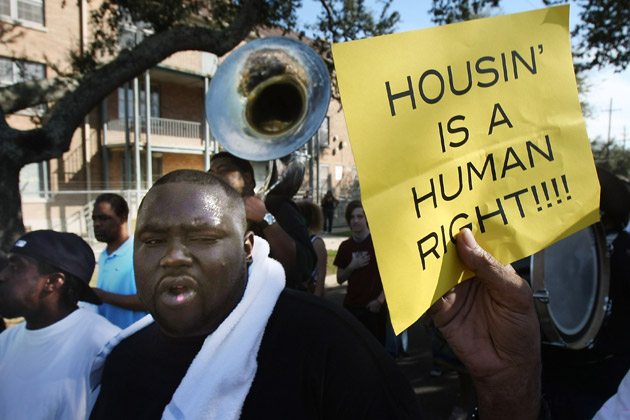
In an effort to prevent the eviction of low-income property owners and small businesses due to the impact of gentrification in urban neighborhoods, Atlanta City Councilmember Keisha Lance Bottoms has introduced legislation requesting a report on establishing Displacement Free Zones in the city of Atlanta.
If the legislation is approved, the Department of Planning and Community Development would have 120 days to provide its findings to the Atlanta City Council.
Across the U.S., an increasing number of cities are using Displacement Free Zones (DFZs) also known as Eviction Free Zones (EFZs), to prevent the displacement of low-income property and business owners due to the impact of gentrification, particularly in urban neighborhoods.
Gentrification is the process whereby low-income neighborhoods, usually in urban areas, are made attractive to high-income residents. What was once low amenity/high density rental complex is turned into a high amenity/low density condominium complex or luxury rental units. The negative result is that the original, low-income tenants in newly gentrified neighborhoods too often can’t afford to remain, primarily due to higher rents; and for a homeowner, higher property taxes and overall cost of living.
To ease the burden, cities are implementing the Displacement Free Zones strategy directly in the neighborhood by providing cap on the rental rates, properties taxes and other initiatives to support long-time residents and business owners.
DFZs are currently being used or considered in cities such as Washington, DC’s Columbia Heights, New York’s Harlem, Los Angeles’ Figueroa Corridor, San Francisco’s Mission district, Miami’s Overton, Portland’s Kern Community Cincinnati’s Over-the-Rhine neighborhood.
According to the Gentrification in America Report, the City of Atlanta ranks fifth on the list of gentrifying cities due to the rapid revitalization of various local neighborhoods.
“While redevelopment is important for many of our underserved communities, it is equally important that we as a city establish inclusive means by which we are able to preserve the historic fabric of these neighborhoods, beginning with our residents and small business owners,” said Councilmember Bottoms. “Exploring the creation of Displacement Free Zones are yet another step in furthering the discussion on ways to combat the displacement of long-time property owners from the city.”
Bottoms said from a small business perspective, she realizes the impact gentrification can have on the bottom line.
“My mother was a long time small business owner and was forced to close her business as a result of anticipated gentrification. This legislation will charge our Planning Department to determine, those portions of the city that would be eligible to be identified as Displacement Free Zones, the strategies to be used to create Displacement Free Zones and the cost estimate to create Displacement Free Zones in eligible areas.”
Lisa Pope, a longtime homeowner in the Summerhill neighborhood near Turner Field said, “I am excited about the redevelopment that I see around Atlanta. But in the 20 years since I purchased my home, many people in the area have moved because they could not afford the rising rent. I am glad to see the city will be exploring ways to make sure this neighborhood will continue to be affordable for everyone.”
Councilmember Bottoms’ proposed legislation will be discussed at 12:30 p.m. on Tuesday, Nov. 29 in the Community Development and Human Resources Community Committee in Committee Room No. 1, Atlanta City Hall, 55 Trinity Avenue, S.W.
For more information, contact the Office of Atlanta City Councilmember Keisha Lance Bottoms at 404-330-6054.
